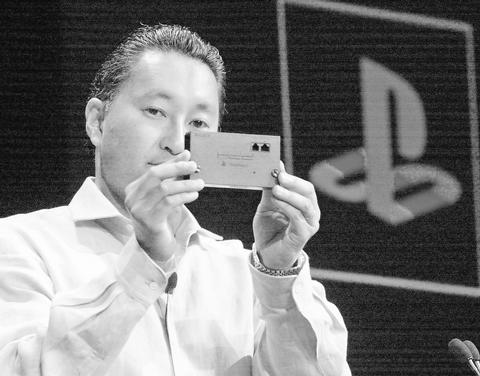The biggest conference in video game history started officially yesterday, but even before the doors open the main characters are locked in a battle that will decide the future of electronic entertainment.
This clash of titans between Microsoft, Sony and Nintendo at the Electronic Entertainment Exposition (E3) may seem to be just about trivial gaming consoles designed for adolescent males with too much time on their hands.

PHOTO: AP
But it is already overshadowing the scantily-clad "booth babes" who will promote over 1,000 new games and gadgets amid a cacophony of sound that will convert the cavernous Los Angeles Convention Center into one giant gaming arcade for three days.
Electronic gaming is the world's fastest growing entertainment industry and its perpetual growth is in marked contrast to the sorry state of the rest of the high tech economy. Last year it had worldwide revenues of US$29 billion.
Most importantly it is seen by all competitors as the surest way to gain control of the most valuable property in the leisure world: the digital living room of the 21st century consumer.
This vision of a connected lifestyle, where our TVs, movies, games, information and communications come through an advanced living room computer, is behind the huge effort made by Microsoft to close the gap with industry leader Sony over the last two years.
So far the signs are not overly encouraging for the software giant from Seattle. Sony's Playstation 2 has sold 30 million units worldwide, compared to just 3.5 million for Microsoft's technically superior XBox.
Nintendo's Gamecube, which arrived later on the market, has sold almost 5 million units.
In the run up to the conference a vicious price war erupted when both Sony and Microsoft dropped the price of their consoles by about a third, bringing down the US price from US$299 to US$199. Nintendo followed by dropping prices this week.
With Microsoft already said to be losing US$75 on every machine it sells, the lower prices represent bad news -- except for the fact that the company has US$30 billion in cash to play with.
On Monday it underlined its ambitions to become an industry player whatever the cost when it revealed that it was investing a further US$2 billion over the next five years to set up an online gaming system that would allow XBox players to compete over the Internet with other gamers in real time anywhere in the world.
With giant data centers in Seattle, London and Tokyo, the new online gaming service will launch in North America, Europe and Japan in October. Fans will pay US$49.95 for a year's subscription that will include a Communicator headset that will allow players to chat to each other -- turning the XBox into a high tech communication system.
"Online technology is the next revolution in video games," said Jim Allard, Microsoft's general manager of the Xbox. "It will fundamentally transform gaming into a new form of social entertainment."
Sony plans to roll out a less proprietary online service later this year, and appears unfazed by the challenge from the world's richest company.
"They are not even in the same league," said Kaz Hirai, the president of Sony Computer Entertainment of America.

The CIA has a message for Chinese government officials worried about their place in Chinese President Xi Jinping’s (習近平) government: Come work with us. The agency released two Mandarin-language videos on social media on Thursday inviting disgruntled officials to contact the CIA. The recruitment videos posted on YouTube and X racked up more than 5 million views combined in their first day. The outreach comes as CIA Director John Ratcliffe has vowed to boost the agency’s use of intelligence from human sources and its focus on China, which has recently targeted US officials with its own espionage operations. The videos are “aimed at

STEADFAST FRIEND: The bills encourage increased Taiwan-US engagement and address China’s distortion of UN Resolution 2758 to isolate Taiwan internationally The Presidential Office yesterday thanked the US House of Representatives for unanimously passing two Taiwan-related bills highlighting its solid support for Taiwan’s democracy and global participation, and for deepening bilateral relations. One of the bills, the Taiwan Assurance Implementation Act, requires the US Department of State to periodically review its guidelines for engagement with Taiwan, and report to the US Congress on the guidelines and plans to lift self-imposed limitations on US-Taiwan engagement. The other bill is the Taiwan International Solidarity Act, which clarifies that UN Resolution 2758 does not address the issue of the representation of Taiwan or its people in

US Indo-Pacific Commander Admiral Samuel Paparo on Friday expressed concern over the rate at which China is diversifying its military exercises, the Financial Times (FT) reported on Saturday. “The rates of change on the depth and breadth of their exercises is the one non-linear effect that I’ve seen in the last year that wakes me up at night or keeps me up at night,” Paparo was quoted by FT as saying while attending the annual Sedona Forum at the McCain Institute in Arizona. Paparo also expressed concern over the speed with which China was expanding its military. While the US

SHIFT: Taiwan’s better-than-expected first-quarter GDP and signs of weakness in the US have driven global capital back to emerging markets, the central bank head said The central bank yesterday blamed market speculation for the steep rise in the local currency, and urged exporters and financial institutions to stay calm and stop panic sell-offs to avoid hurting their own profitability. The nation’s top monetary policymaker said that it would step in, if necessary, to maintain order and stability in the foreign exchange market. The remarks came as the NT dollar yesterday closed up NT$0.919 to NT$30.145 against the US dollar in Taipei trading, after rising as high as NT$29.59 in intraday trading. The local currency has surged 5.85 percent against the greenback over the past two sessions, central